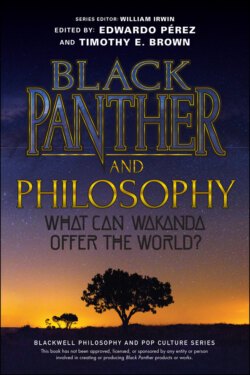Читать книгу Black Panther and Philosophy - Группа авторов - Страница 40
“I’ve Seen Too Many in Need Just to Turn a Blind Eye.”
ОглавлениеIfeanyi Menkiti argues that proverbs and wisdom within African thought and tradition uphold mutuality and the sense of not holding one’s self above others. He presents two proverbs from Igbo cultures (from Nigeria) that he argues can provide “ordering perspective with which we can approach justice.”20 The first, ebele umu uwa translates to “pity the children of the world.”21 The proverb is not a call to feel pity or mercy for those poor children out there, but rather an expression that includes one’s self. It acknowledges that we are all in a situation of requiring pity. The point is not to put us down, but, as Menkiti explains: to “make possible the practice of reconciliation on an ongoing basis; [the proverb] makes possible also the acknowledgements that all of us need and can use, so as not to come down too heavily on ourselves and the moments of personal error, personal failure or professional defeat.”22
For Menkiti, this position of pity and mercy enables one to “better position oneself to uphold the perspective of human dignity, even as failures and breakages occur all around one.”23 It thus encourages a worldview that holds “that human dignity is hard-won; it is precarious and constant effort is needed to uphold it.”24 The expression cannot be easily or simply translated, but the above discussion reveals that it is an inclusive statement, speaking to the reality we all find ourselves in, and a sense of mutually upholding human dignity within it (through pity, forgiveness, reconciliation). Indeed, Menkiti reinforces this sense of mutuality with another proverb: “aka nni kwo aka ekpe, aka ekpe kwo aka nni,” which means “the right hand washes the left, the left hand washes the right.”25 He argues that we would do well to approach international relations through the lens of these “many innocuous rituals of daily life.”26
These examples are not exhaustive of all that African philosophy can contribute to this debate, nor do they suggest there is complete consensus. They do suggest, however, that there is a strong strand of African philosophy that, drawing from traditional conceptions of justice and society, argues for accounts of what we owe each other that lean toward the cosmopolitan, toward the welcoming and inclusion of, dependence on, and respect for the other. Truly, it is striking that these themes are not given a more central place in the way of life of Wakanda, supposedly an example of an isiXhosa-speaking African community, unaffected by any external influences.
